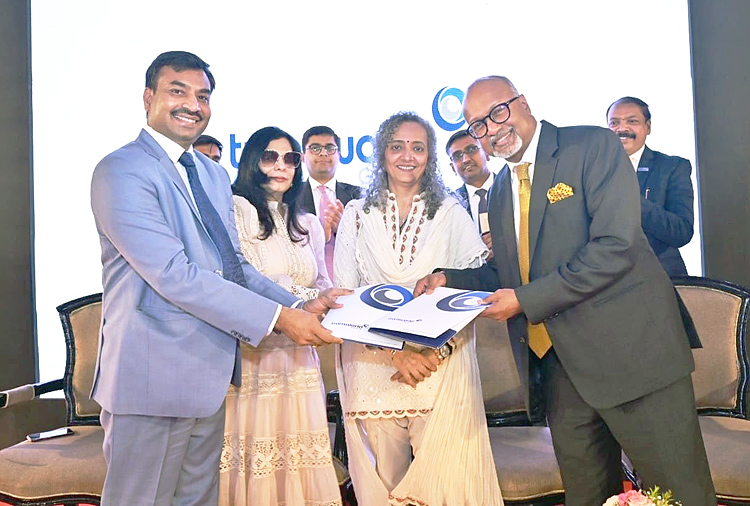EXCLUSIVE
“India’s Charter Segment is Under-Served” — Arun Kashyap
An Unserved private charter segment propels MRO veteran Arun Kashyap to start off on his own new venture Sirius India Airlines by partnering with a UAE-based conglomerate Airavat Aviation

SIRIUS INDIA AIRLINES
Arun Kashyap, Promoter and CEO of Sirius India Airlines, is an aviation veteran with a Master’s in Air Transport Management from City University, London, boasting over 25 years of global experience. He’s held key roles at Jet Airways, Oman Air, Flydubai, Air India, and SpiceJet where he spearheaded major initiatives.
The Q&A below is an attempt to give a brief glimpse into the life of Arun Kashyap, the reasons behind the major switch from MRO to charters and his reasons for diving into the interesting world of business aviation. Speaking to Swaati Ketkar for SP Guide Publications in an exclusive interview, Arun Kashyap tells us about his plans for the new venture, his thoughts on fractional ownership and the post-pandemic luxury and business aviation segment in India. Read on...
Swaati Ketkar (Swaati): First of all, congratulations on the launch of a new charter company, Sirius India Airlines. What attracted you to the charter segment of aviation?
Arun Kashyap (Arun): Thanks for your wishes! The charter segment of aviation offers unique opportunities for personalised, flexible travel experiences. And most importantly the sector is under-served; and which was a key factor in our decision to launch Sirius India Airlines in this segment.
Swaati: The switch from MRO to Charter came as a surprise to many. Can you tell our readers your thoughts behind this switch?
Arun: While I may not have a lot of specifics to share right now, it’s crucial to understand that we have not stopped our MRO business. In reality, our MRO services complement and bolster our Charter business.
Swaati: Which are the routes you are planning to explore initially i.e – at the launch phase of operations?
Arun: As a charter business, we don’t have fixed route planning. We’re prepared to cater to client demands anywhere in India primarily. With our partners, Airawat, (a Transworld Group company), having the capacity for international charter travels, we’re certainly looking to explore that market as well.
Swaati: You initially plan to start operations with a Hawker 4000 aircraft and with plans to add another three aircraft this financial year. What is your aircraft of choice for fleet expansion and why?
Arun: Initially, our operations will be solely with the Hawker 4000 aircraft. Our plan is to incorporate two additional aircraft between September and February this year. Introducing another class or make of aircraft could potentially raise operational and maintenance costs. We are also evaluating other aircraft types in all segments to cater our future growth.

Swaati: Your thoughts on fractional ownership in private charter. How will it give a much-needed boost to the segment?
Arun: Fractional ownership in private charter is a promising avenue that can revolutionise the segment. It allows individuals and businesses to enjoy the benefits of private air travel without the burdens of full ownership. This model can significantly boost accessibility and affordability in the private charter sector and will enhance the demand of business jet in country.
Swaati: Will you consider operating under RCS-UDAN routes? How relevant do you find the RCS-UDAN to BA and GA industry in India?
Arun: We are not considering operating under RCS-UDAN routes in this segment of business. The RCS-UDAN scheme is not so relevant to Business Aviation in India. For fostering growth and accessibility, RCS is more relevant in commercial aviation with different type of aircraft fleet. We don’t fall into the same with Business Jet.
“FRACTIONAL OWNERSHIP IN PRIVATE CHARTER CAN SIGNIFICANTLY BOOST ACCESSIBILITY AND AFFORDABILITY IN THE PRIVATE CHARTER SECTOR AND WILL ENHANCE THE DEMAND OF BUSINESS JET IN COUNTRY”
Swaati: Luxury and business charter segment is on a roll in India, especially post-pandemic. Your views?
Arun: The luxury and business charter segment in India has seen significant growth, especially post-pandemic. This trend reflects the increasing demand for personalised, safe, and efficient travel options. We are excited to contribute to this thriving market and provide unparalleled service to our clients. However, the private charter segment in India is underserved and holds immense potential for growth. While competition is increasing, there is still ample room for new players to enter the market and offer innovative services. Positives include a growing affluent class, increasing business travel needs, and a desire for exclusive travel experiences. However, challenges such as infrastructure development and regulatory complexities need to be addressed, with collaboration between industry and authorities.
Swaati: Any words of advice to potential investors planning to venture into private charter market in India?
Arun: As a new business entity in this sector, speaking from that limited experience wouldn’t be appropriate. However, drawing from our extensive years in this industry, we have some advice for new entrants. To potential investors eyeing the private charter market in India, I would suggest thorough market research and a strong emphasis on customer-centric services. Understanding the diverse needs of travellers and delivering customised, high-quality experiences will be pivotal for success. Furthermore, staying updated on regulatory shifts, Operational challenges and investing in infrastructure will be essential for sustainable growth in this dynamic sector.





